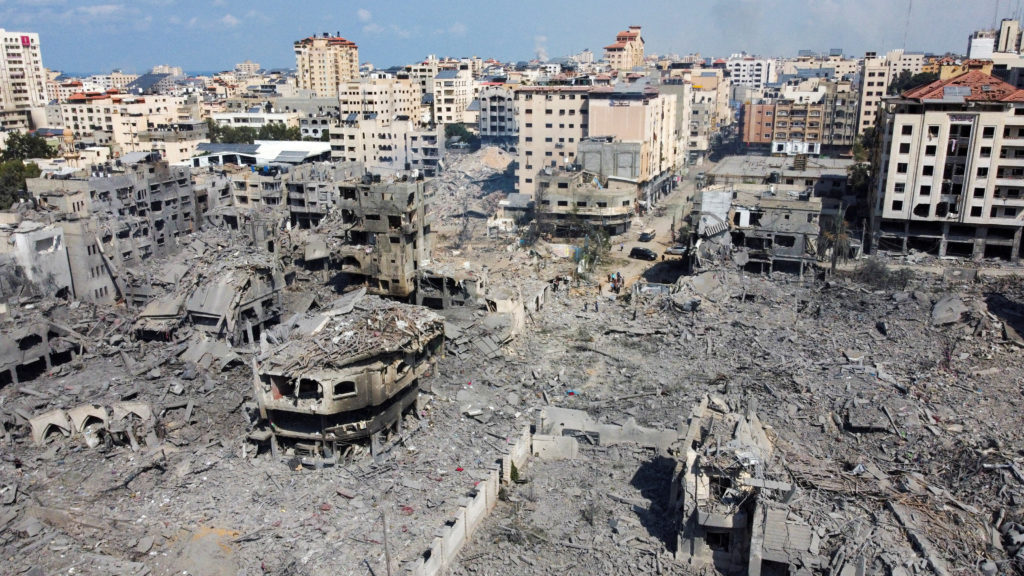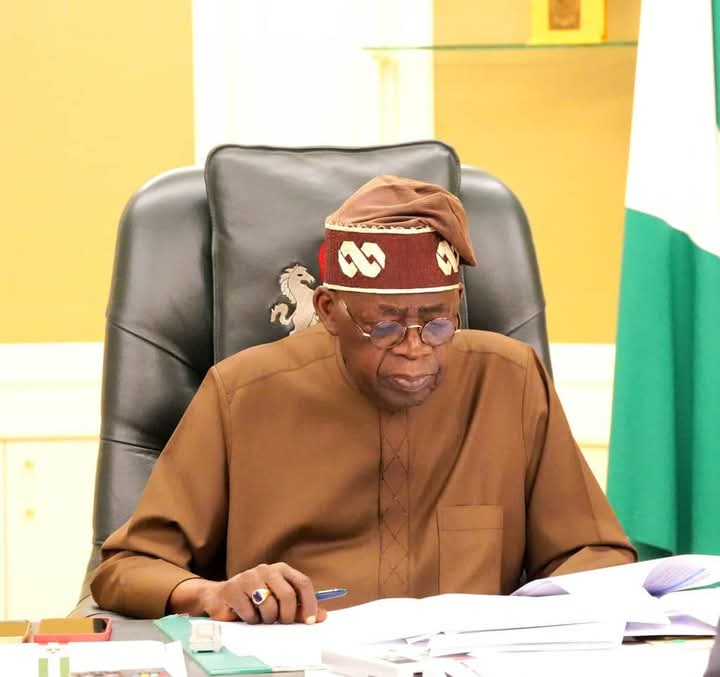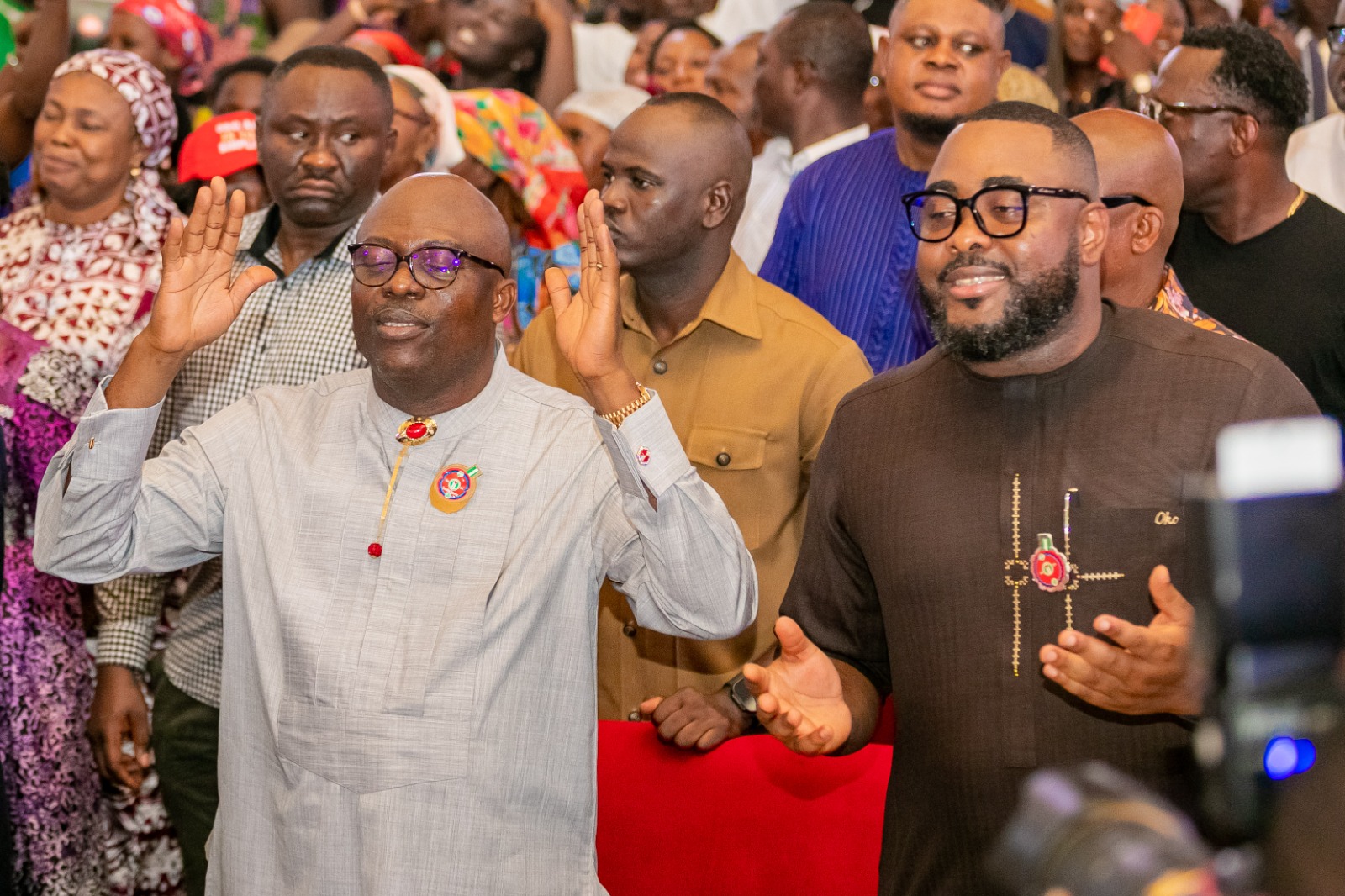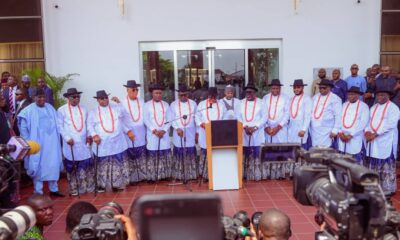Editorial
That National Security Adviser’s Alert
On the 26th of last month, vigilant security operatives discovered 13 containers carrying illegal lethal weapons at the Apapa Port in Lagos. The contents of the containers included rocket propelled grenades, missile launchers, heavy machine guns, bombs and explosives, sophisticated rifles, and automatic weapons, among others. This discovery, in no mean measure, frightened majority of Nigerians to their marrow.
Precisely 16 days after, the State Security Service (SSS) informed Nigerians that the vessel with the illegal arms, actually arrived Tin Can Island Port on July 10 with 371 containers, out of which 83 were discharged at Frano bonded warehouse at Cele-Ijesha in Lagos. The SSS added that 13 of the 83 containers, moved from Frano to AP Molar Terminal, Apapa Port on October 20, were the ones found to be carrying the dangerous weapons. This revelation also exacerbated the fear of insecurity that had enveloped the nation.
But barely one month after the discovery was made, National Security Adviser to the President, Lt-Gen Andrew Owoye Azazi, last weekend in Awka, Anambra State, confirmed the fears of most Nigerians that the worst might not yet be over.
Delivering a paper on National Unity and the Challenges of Internal Security, at the annual lecture series and mini arts exhibition 2010, organised by the Centre for Victims of Extra-Judicial Killings and Turture (CVEKT), with the theme, “Human Rights and National Security: Challenges for Emerging Democracies”, Gen Azazi hinted that the issue of illegal arms proliferation in the country has assumed an alarming proportion.
In the paper presented by Brig-Gen Mohammed Ali, the national security adviser specifically blamed desperate politicians for stockpiling arms and ammunition, saying that politicians have intensified the training of thugs and provision of fake service uniforms in preparation for the 2011 general elections.
For us, these are very serious allegations that heighten our sense of insecurity. And coming from one of the stature of the national security adviser, these concerns should be taken even more seriously because nothing tangible can come out of the planned electioneering process in an atmosphere of insecurity.
However, Azazi will not be the first to raise this alarm. Government had made similar allegations before without any pragmatic step to arrest and prosecute those found culpable. In fact, in the last couple of months, some of the politicians have been accusing one another of plotting to perpetuate security breaches with intent to hijack the political process. This is why Azazi’s alarm requires urgent national attention.
We say so because, a security adviser to a president, we believe, is exposed to all necessary intelligence briefings from various security agencies, and is expected to speak publicly, dully informed of all available facts. Who, for instance, are the politicians? How untouchable are they that security operatives cannot bring them to justice? Most importantly, what has the security agencies done about the information?
The Tide challenges, not just the national security adviser to the president but all security agencies to expose those suspected political arms dealers. This is because unless something drastic is done now to serve as a warning shot for any politician intent on destabilizing the democratic process, all attempts to fashion an effective and efficient election programme will turn to naught.
This position has become even more compelling because very little was heard of previous cases where politicians were accused of importing sophisticated arms, which they deployed to hijack the electoral process, and at the end, unleashed a reign of terror on law-abiding citizens. In fact, it is on record that in the past, many Nigerians had lost their lives, some maimed while others were brazenly intimidated and forced out of the political process by thugs hired and armed by overzealous and desperate politicians, who want to win elections, by either hook or crook.
We cannot allow this ugly scenario to repeat in 2011. If Nigerians tolerated the militarization of the electioneering process in 1999, 2004 and 2007, we think this is the time to say ‘enough is enough’. Perhaps, now is the time to start working towards preventing any kind of security breach that may truncate the current political process.
The Tide insist that the security agencies owe the nation an obligation to quickly arrest any politician confirmed to be stockpiling illegal arms and ammunition, recruiting thugs and procuring fake service uniforms, in preparation for a season of violence during the 2011 elections. Arresting such politicians, their foot soldiers as well as confiscating already procured weapons would no doubt; forestall any violence during and after the planned general elections.
In addition, we challenge the Federal Government to muster the political will to arraign and prosecute those politicians planning to foment trouble during the elections. We make this challenge, believing that in a society where the rule of law reigns, nobody, not even the most successful or popular politician, is a sacred cow.
Beyond that, The Tide reckons that it is only when those who violate the rules of engagement in the political process are swiftly tamed, that the rest of the society can begin to see a ray of hope in their future and those of their children. We say this, convinced that it is only when Nigerians are sure that the political landscape is peaceful and safe, would they volunteer their lives, time and energy on Election Day to cast their votes, which both the government and the Independent National Electoral Commission (INEC), have repeatedly assured, must count this time around.
We vehemently advise all security agencies and well-meaning Nigerians to stand up, and resist the temptation of allowing corrupt, evil and mediocre politicians to populate the polity, once again. This is our stand.
Editorial
Israel-Gaza War: Sustaining The Ceasefire

Editorial
No To Hike In Telecom Tariffs

Nigerians are outraged by the Federal Government’s approval of a 50 per cent increase in telecommunications tariffs, with organised labour threatening to mobilise workers to boycott telecom services. The Nigeria Labour Congress (NLC) and the Trade Union Congress of Nigeria (TUC) have described the upcoming tariff as outrageous, lamenting that it will worsen the already harsh living conditions of workers and the masses.
Similarly, the Coalition of Northern Groups (CNG) rejected the hike, stating that it was ill-timed and did not take into consideration the struggles of Nigerians. The Human Rights Writers Association of Nigeria (HURIWA) also criticised the review, calling it an illegal, unconstitutional, and oppressive policy that undermines the fundamental rights and freedoms of Nigerians. It is a difficult moment for the industry.
Recall that the Nigerian Communications Commission (NCC) approved a 50 per cent increase in tariffs for telecom operators last Monday, instead of the 100 per cent raise that operators had requested. This decision quickly angered the consumers’ association, which criticised the government’s approval as not only punitive but also insensitive.
We wholeheartedly agree with the stance of labour and other groups on this very sensitive matter. We unequivocally condemn the 50 per cent increase in telecom tariffs. Though telecom operators cite higher operational costs and inflation as reasons for the hike, the timing and impact raise serious concerns in the current economic situation. It is a blatant attack on the well-being of the Nigerian worker and a betrayal of the people to corporate interests.
Telecommunication services are essential for daily communication, work, and access to information. However, the average Nigerian worker already spends approximately 10 per cent of their wages on telecom charges. For a worker earning the current minimum wage of N70,000, this means an increase from N7,000 to a staggering N10,500 per month or 15 per cent of their salary, a cost that is unsustainable.
This hike exemplifies the government’s apparent ease in prioritising corporate profits over citizens’ welfare. It is shocking that the government approved a 50 per cent tariff increase for telecom companies within a month, yet took nearly a year to approve the recent minimum wage for workers, despite the rising cost of living and inflation eroding purchasing power.
The questions are: When will the government stand up for the citizens it swore to protect? When will the National Assembly rise to its responsibility and hold the Executive accountable for policies that blatantly undermine the welfare of the majority? When will the common man finally heave a sigh of relief in Nigeria? We urge the government, the NCC, and the National Assembly to review the implementation of this ill-advised increase.
It is difficult to understand the state of mind of the managers of the nation’s economy. Sadly, these managers have alienated themselves from the reality of today. How can a government approve a 50 per cent hike in the tariff of telecom services when even the N70,000 minimum wage has been eroded by inflation, electricity tariff hikes, exorbitant fuel costs, transportation, and other social services?
Even if there is a need for an increase, why does it have to be 50 per cent? If, after dialogue, it is agreed that a raise is necessary, we should all consider a more reasonable increase rather than the 50 per cent hike. Fifty per cent is excessive and will only worsen the already harsh living conditions of workers, placing a heavier burden and more suffering on them and the general population.
The recognition of telecommunication services as essential components of modern society cannot be overstated. In an era characterised by rapid digital transformation, these services are fundamental not only for personal communication but also for facilitating broader socio-economic engagement. The proposed tariffs increase in the telecom sector raises critical concerns regarding equitable access to vital services that support communication, education, healthcare, and commerce.
In a democracy, the people should be the central focus of all government actions and policies. Every decision should aim to improve their quality of life. This plan must be carefully scrutinised with the welfare of citizens in mind. An increase in telecom tariffs will negatively impact many Nigerians, as the internet has become an essential tool for business, communication, and daily activities.
The Tide calls for the immediate suspension of the 50 per cent hike in tariffs. Instead, we recommend a more reasonable adjustment of a maximum of 10 per cent, which balances industry sustainability with the current economic realities in the country. We also demand that the NCC engages in genuine, inclusive consultations with consumer advocacy groups, civil society organisations, and other grassroots stakeholders before implementing any tariff adjustments.
Editorial
Hurray, Siminalayi Fubara Is 50!

Born on January 28, 1975, in Opobo Town, Mr. and Mrs. Joseph and Love Fubara welcomed their second of five children and first son. His father, a former soldier who completed an overseas training tour of duty, instilled in him a strong sense of discipline and dedication. His mother, a civil servant, taught him the importance of hard work and perseverance.
He received his primary education at Opobo Primary School and continued his studies at Comprehensive Secondary School in Opobo. His passion for numbers led him to pursue a degree in Accountancy at the then Rivers State University of Science and Technology, now known as Rivers State University.
Upon completion of his Bachelor’s degree, he pursued further education and obtained a Master of Business Administration (MBA) and a Master of Science (MSc) from the prestigious University of Port Harcourt in 2013 and 2016, respectively. Fubara’s dedication to his studies and his commitment to personal growth have shaped him into the accomplished individual he is today.
Sim, fondly called by his colleagues, started his career in 2003 as a principal accountant at the Rivers State Senior Secondary Schools Board. His dedication led to his promotion to Director of Finance and Accounts at the Government House in 2015. In March 2020, he was appointed Permanent Secretary and then became the Accountant-General of Rivers State on December 23, 2020.
His achievements are numerous, as he is a Knight of the St. Christopher (KSC) Order of the Church of Nigeria Anglican Communion. Additionally, he holds the prestigious traditional chieftaincy title of Amaopusenibo of Opobo Kingdom. The Governor’s commitment to family is evident through his marriage to Valerie Ibiere Fubara, with whom he shares three beautiful children.
Among Siminalayi’s other significant qualifications and accomplishments are his fellowship with the Nigerian Institute of Management and his fellowship with the Association of National Accountants of Nigeria (ANAN). He holds membership in the Chartered Institute of Forensic and Investigative Auditors. His impressive background has gained him the trust and support of the Peoples Democratic Party (PDP), leading to his victory in the party’s governorship primaries for the 2023 general elections.
Fubara embodies a leadership style defined by simplicity and compassion. He exhibits patience, confidence, and empathy in his interactions with those he serves. His humility and faith in God make him trustworthy. Representing the younger generation, Sim leads with the slogan “Consolidating and Continuing the New Rivers Vision,” focusing on developing infrastructure, healthcare, education, security, agriculture, and investment opportunities for Rivers State.
The bravery exhibited by His Excellency in resisting godfatherism has attracted respect from a wide array of Nigerians, Africans, and supporters of democracy around the world. He emphasises serving the interests of the people of Rivers over any godfather. His actions unify diverse groups in the state, promoting a sense of belonging among various ethnicities.
Our affable Governor exemplifies robust moral leadership rooted in his Christian beliefs. As a devoted Knight, he shows compassion and selflessness in his governance. He fosters an environment where all religions can peacefully coexist. Fubara sponsored Muslim pilgrims for the 2024 Hajj and personally wished them well, encouraging them to pray for the state and Nigeria. His religious tolerance has earned him respect among Nigerians who value coexistence.
Moreover, the Governor’s appealing physique and charming smile have garnered admiration from many Nigerians, who view physical beauty as a reflection of inner qualities. His tall stature has solidified his status as a revered figure, commanding respect across the nation. Fubara has shown dedication to women’s issues by initiating several programmes in collaboration with the Women Affairs Ministry and the Office of the First Lady, highlighting his strong commitment to women’s empowerment and gender equality.
Sir Fubara has focused on actively involving young people in his governance by launching entrepreneurship and training schemes, notably the Rivers State Youth Empowerment Scheme. His efforts to support youth have earned him the backing of many young Nigerians. Additionally, he provides scholarships and makes donations to orphanages, demonstrating his commitment to investing in education for the benefit of children in the state.
Known for his strong commitment to national unity, this Governor reaches out to Nigerians from various backgrounds. As a state Governor, he demonstrates great nationalism by supporting citizens from other states, especially in Rivers. He respects the rule of law and democratic values, which has enabled past local government chairmen to complete their terms without issues. His effective management of Rivers State’s resources promotes transparency and accountability.
Despite facing numerous distractions, the Rivers Chief Executive has made remarkable strides in steering the state’s affairs, reflecting his unwavering focus and commitment to delivering results. He has encountered challenges but remains dedicated to his vision for a better state. His peaceful and caring leadership style has made him popular, inspiring new leaders to emulate similar qualities. By being strong yet compassionate, he has redefined the concept of leadership. Fubara’s selfless nature prioritises the state’s needs above his own. This has earned him widespread support.
As he commemorates his Golden Jubilee birthday today, even the most ardent critics, adversaries, and accusers cannot overlook that he embodies a worthy precursor in every sense.
Happy Birthday, His Excellency!
-
News2 days ago
Monarchs, MOSOP Hail Tinubu Over Ogoni Varsity Approval
-
Politics1 day ago
Anambra LP Aspirant Advocates Security Details Withdrawal From Politicians
-
Rivers1 day ago
Dance Organisation Set To Hold Competition In PH
-
Nation1 day ago
Commissioner Applauds Council Chairman’s Dev Strides
-
Business1 day ago
Ekpo Urges For Domestic, Export Market Boost In Gas Supply
-
News2 days ago
NIS Begins Contactless Passport Application In Europe, Friday
-
Politics1 day ago
Grassroots Governance: Otu Signs Cross River Local Government Amendment Bill Into Law
-

 News1 day ago
News1 day agoFubara Attends PDPGF Meeting In Asaba …..Back Court Verdict On National Secretary Position

